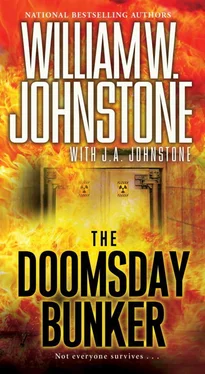“There’s still a base there,” Larkin said. “It’s just a reserve base now.”
“Yeah. So they don’t have any need for nuclear bombs, do they?”
“I thought you said this place you’re talking about was where they kept missiles.”
“They had missiles to protect the bombs .”
“I get it,” Larkin said, although he wasn’t sure he did. “But now the installation is empty?”
“Yep,” Adam said. “For now. But not for long, if this guy I’m telling you about has his way.”
“Okay, run it past me again,” Larkin said as he reached for his glass of iced tea. The plate in front of him was empty except for a couple of tiny smears of barbecue sauce, all that was left of his weekly lunch with his fellow retired Marine.
The two men were in what looked like a hole-in-the-wall dump of a restaurant, but actually it had some of the best barbecue to be found in Fort Worth. Located near the big aircraft plant, the place was usually packed with guys Larkin could tell were engineers just by looking at them. It was popular with retired military, too, and there were a lot of them in this area.
“Okay,” Threadgill said. He had let himself go more than Larkin had, but you could still kind of see the tough, squatty noncom he had been. “The Air Force had this secret underground base out in the hills west of town where they stored all the nuclear bombs they’d stockpiled for the B-52s and B-58s that flew out of the regular base. This was in the early Sixties, you know, when the Cold War was at its height. Everybody was afraid the Russians were going to try to bomb the hell out of us at a moment’s notice. Considering there was a stockpile of nuclear weapons here, this whole area was considered a prime target for the Russkies. So they put in Nike Hercules missiles to guard the place. In fact, there were missile bases all around the Dallas/Fort Worth area, but the one I’m talking about was secret . You can’t find out anything about it even on Wikipedia.”
“Then how do you know about it?”
“You forget, I grew up around here. My dad worked at General Dynamics, right across the runways from the Air Force base. All the kids whose dads worked at GD knew about the missile base. And it scared the shit out of us thinking that the Russians had painted a big bull’s-eye on the whole area.”
“So your dads who worked on the flight line knew about it. Wow, that’s some really top-notch military security there.”
“What can I say?” Threadgill shrugged. “The Russians never bombed us. Maybe they didn’t know about it, after all.”
“They should have put a few sleeper agents into the elementary schools around here.”
“Anyway, the empty silos are still there, and so are the bunkers where the warheads were stored, along with all the fire control and administrative areas. It’s almost like an underground mall, but there’s nothing in it. It’s been sitting there like that for all those years, just waiting for somebody to come along and put it to good use.”
“Like this guy Moultrie you were telling me about.”
“Yeah. Graham’s got vision.”
Larkin was pretty sure Threadgill was quoting something Graham Moultrie had said. In his experience, he was a little suspicious of anybody who claimed to have vision . All too often, a businessman who said that was just after a buck. A politician who started spouting about it was after power… and a buck. None of it ended well.
“Moultrie bought the property?”
“Yeah. From the way he talks, the government was glad to get rid of it. It’s kind of a white elephant. It’s never been sold to a real-estate developer because then they’d have to disclose the fact that nuclear material used to be stored there. Otherwise, if somebody bought the property and covered it with McMansions, they’d be opening themselves up to lawsuits for not revealing that. But in Graham’s case, he knew what had been down there and bought it as is.”
“Complete with radiation contamination.”
Threadgill shook his head. “No, the place is clean. He’s had it checked up one way and down the other. It’s perfectly safe.”
A dubious frown creased Larkin’s forehead. “Yeah, but if he’s trying to sell shares in the place, he’s not going to admit that it might give you radiation poisoning, is he?”
“He’s going to live there himself, if that day ever comes, God forbid. He wouldn’t move into a place he knew would kill him, would he?”
“I suppose not,” Larkin admitted. “It wouldn’t be much of a survival bunker if it was going to kill you.”
Survival bunker … It said something about the state of the world that such a term had even come into being. Of course, back when he was a kid, Larkin had heard people talking about fallout shelters, even though the craze where everybody wanted one in their backyard had passed more than a decade earlier. Even most of those had been nothing more than glorified storm cellars, a place where you could go to hunker down safely until a tornado blew over. You couldn’t wait out a nuclear war in one of them, though.
A survival bunker was different. He had read up on them, even before Adam Threadgill got interested. Most of them were set up in abandoned military installations like the one Threadgill was talking about, underground bases hardened against not only nuclear blasts but also electromagnetic pulses, chemical and biological warfare, and any other hideous threat the modern world could dish up. They were big enough to hold more than just a family; most could house hundreds of people in relative comfort and were self-sustaining with generators to provide power, plenty of room for stored rations, equipment to supply clean water, and even gardens to grow food hydroponically in case the rations ever ran low. Theoretically, people could live safely under the ground for years no matter what went on above them on the surface.
What would they find when they came up, though?
Larkin pushed that thought out of his head. Always a practical man, he said, “What’s it going to cost to buy some space in there?”
Threadgill’s beefy shoulders rose and fell. “I don’t know exactly. I’m not sure Graham’s figured out the price yet. He said he’s putting at least twenty million into developing it, though. So that’s fifty K per person just to recoup his investment. I figure he’s going to be asking somewhere in the neighborhood of $75,000 each to cover contingencies and allow him to make a little profit.”
“Twenty million?” Larkin let out a low whistle. “If he’s got that kind of money, what’s he doing getting mixed up in a thing like this? Why doesn’t he just build himself a bug-out space and call it good?”
“Because like I told you, he’s a visionary. He wants to help people. Besides, we’re talking worst-case scenario here, right? The end of the world as we know it. What’s the point of escaping that if you’re the only one left? Well, I mean, he’s got a wife, but you know what I mean. They don’t want to open a hatch and find the world devastated with no way to start over. So he needs enough people to have a real community. That way the human race has still got a fighting chance.”
“I guess that makes sense. Still, seventy-five K…”
“To ensure that you and Susan survive. Doesn’t sound like much then, does it?”
Larkin squinted at his friend and said, “You’re not gettin’ a kickback on this, are you?”
“Me? No, I—” Threadgill stopped, frowned at Larkin for a second, and then laughed. “You’re kidding me, aren’t you?”
“Mostly.”
“No, I don’t have a piece of the deal. There’s no discount for drumming up new customers, either. I’m trying to scrape up enough for me and Luisa and the kids.”
Читать дальше









